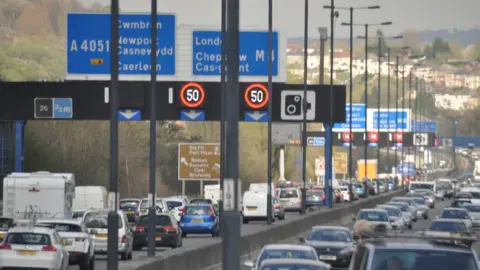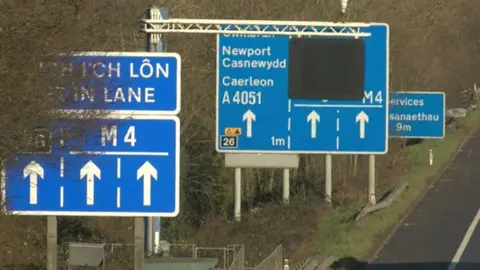Newport M4 traffic jams: Average 50mph limit recommended
 Geograph/Lewis Clarke
Geograph/Lewis ClarkeAn average speed limit of 50mph should be introduced to tackle congestion on the M4 around Newport, the commission set up after the decision to scrap the relief road has said.
South East Wales Transport Commission recommended "fast-track" measures to ease traffic at the Brynglas tunnels.
These would help reduce the "ripple effect" of changes in speed which disrupt traffic, it said.
The 50mph limit between junctions 24 and 28 would apply all day.
In a progress report on its work, the commission conceded this would mean slower travel times for vehicles at off-peak times.
"It is worth noting the case for 50mph speed control goes beyond congestion alleviation. There are also good arguments from an emissions and road safety perspective - these apply to all parts of the day," it said.
It also recommended providing "additional lane guidance" on the westbound approach to the tunnels and collapsible bollards to prevent late lane changes.
The report called for better traffic officer support, with formalised response time targets and a wider patrol area to cover the A48 and A4810 in Newport.
The commission was formed in October in the wake of the controversial decision to scrap the M4 relief road, and was told to look at alternatives.
Why is traffic so bad at the Brynglas tunnels?
The commission looked at the M4 between junctions 23 and 29.
The report said: "Congestion worsens when vehicles travel at different speeds and frequently change lanes. This is particularly significant when approaching the Brynglas tunnels at peak times.
"We believe there are some traffic management measures that can help alleviate some of the problem."
The report said the M4 near Newport was the fourth most congested stretch of urban motorway in the UK and ranked in the top 50 hotspots in Europe.
It found the motorway struggled to provide reliable travel for more than 3,000 to 4,000 vehicles per hour - at peak times, traffic approaching the tunnels was about 4,000 to 5,000 vehicles per hour.
The majority of journeys involved Cardiff, Newport and Bristol and data suggested there were more people living in Wales and working in England than the reverse, it said.
Congestion was a symptom of broader issues, it added, "in particular the lack of viable or attractive alternative transport options".
"Our initial analysis shows that for trips within the region, private car travel on the motorway is very often both quicker and cheaper than public transport, even accounting for congestion. This understandably prompts people to use their cars."

What could happen in the long term?
The report said there was "merit" in improving alternative forms of transport for the most popular journeys.
The commission said its considerations would include:
- options for better cycle routes between Cardiff and Newport
- how to manage demand for different types of transport at different times, including charges that could provide funding for public transport
- ways to promote public transport to get people out of their cars, including better information, ticketing, and working with larger employers
- how to improve public transport to give more choice for journeys between Cardiff, Newport and Bristol.
The commission said it aimed to publish an interim report in the spring 2020 and a final report around the end of 2020.
What have business groups said?
CBI Wales director Ian Price said the report was disappointing and the recommendations would "do very little to help anyone".
"Business keenly awaits the second part of the commission's work. South Wales deserves a road fit for the future. The government must do more than just solve congestion - it must give the region room to grow," he said.
Ben Francis, FSB Wales policy chairman, said it was crucial improvements were made "on this vital infrastructure corridor".
"As the commission's report recognises, road-based solutions are not the only answer to transport issues in south Wales… Providing reliable, good quality public transport through the South Wales Metro and other options will be as important for the overall transport issues in south Wales."
